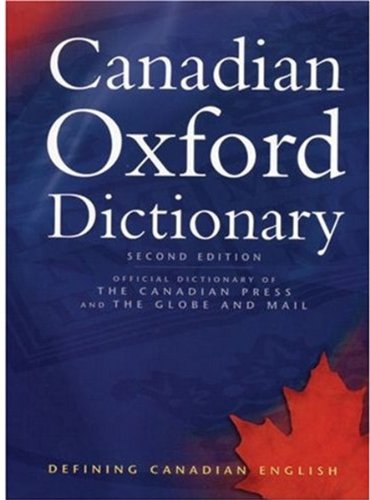The second and possibly last edition of the Canadian Oxford Dictionary (COD) was published in 2004. Sales are still going strong. Could this be partly why Oxford University Press has not published a new edition in 15 years?
In its summer 2013 issue, Taddle Creek, a general interest Toronto literary magazine, asked the question, “Whatever Happened to the Canadian Oxford?” Taddle Creek spoke to David Stover, who was then the president of Oxford University Press Canada. He assured the magazine that the COD is “still a going concern.” “We certainly still sell a lot of copies,” he said. This is my point exactly. Moreover, the COD, similar to other print dictionaries, is probably seeing a decline in print dictionary sales and is considering online versions in the future.
Uniquely Canadian references
How important is the COD? The first edition was a runaway bestseller, spending over a year on the Globe and Mail’s bestseller list. The dictionary combines international English with English as it is spoken in Canada. Definitions present the Canadian meaning of a word first.
The 2004 second edition of the COD contains about 300,000 entries, including 5,000 new words and 2,200 uniquely Canadian terms (like double-double) as well as unique Canadian meanings, usage notes, idiomatic expressions, biographical entries and place names. It also contains information on Canadian pronunciation and spelling, which has features of British and American spelling.
Simply put, the 2004 edition blew away the competition for years to come. It was forward-looking in its treatment of technology words (such as web, Web and website), which people were struggling with at the time it was published. It is comprehensive for a “short” dictionary, even including names of Indigenous bands. In Canada, a band is an Indian community officially recognized as an administrative unit by the federal government. Band council is also a Canadian term, as are Indigenous and First Nation. As you probably know, in the federal government, the term Indigenous has replaced Indian, Aboriginal and Amerindian, except in the Indian Act. Amerindian, used in the U.S., is seldom heard in Canada because, in Canada, American Indian means someone living in the U.S., according to the COD. Who said that Canadian English is not different from American English?
Alternative dictionaries
Then in 2008, Oxford shut down the COD project by laying off its staff of lexicographers in Canada, including the dictionary’s well-known editor, Katherine Barber. At the time, Oxford promised to employ freelance editors (according to Canwest News Service) to help create future editions. However, 15 years later, there is still no news of an upcoming edition, leaving Canadian professional writers and organizations in the lurch.
Some alternative dictionaries that offer information not contained in the COD include the Collins Canadian Dictionary, the Shorter Oxford English Dictionary and Merriam-Webster’s Collegiate Dictionary. Which one do you prefer?
The Editors’ Weekly is the official blog of Editors Canada. Contact us.
Discover more from The Editors' Weekly
Subscribe to get the latest posts sent to your email.
